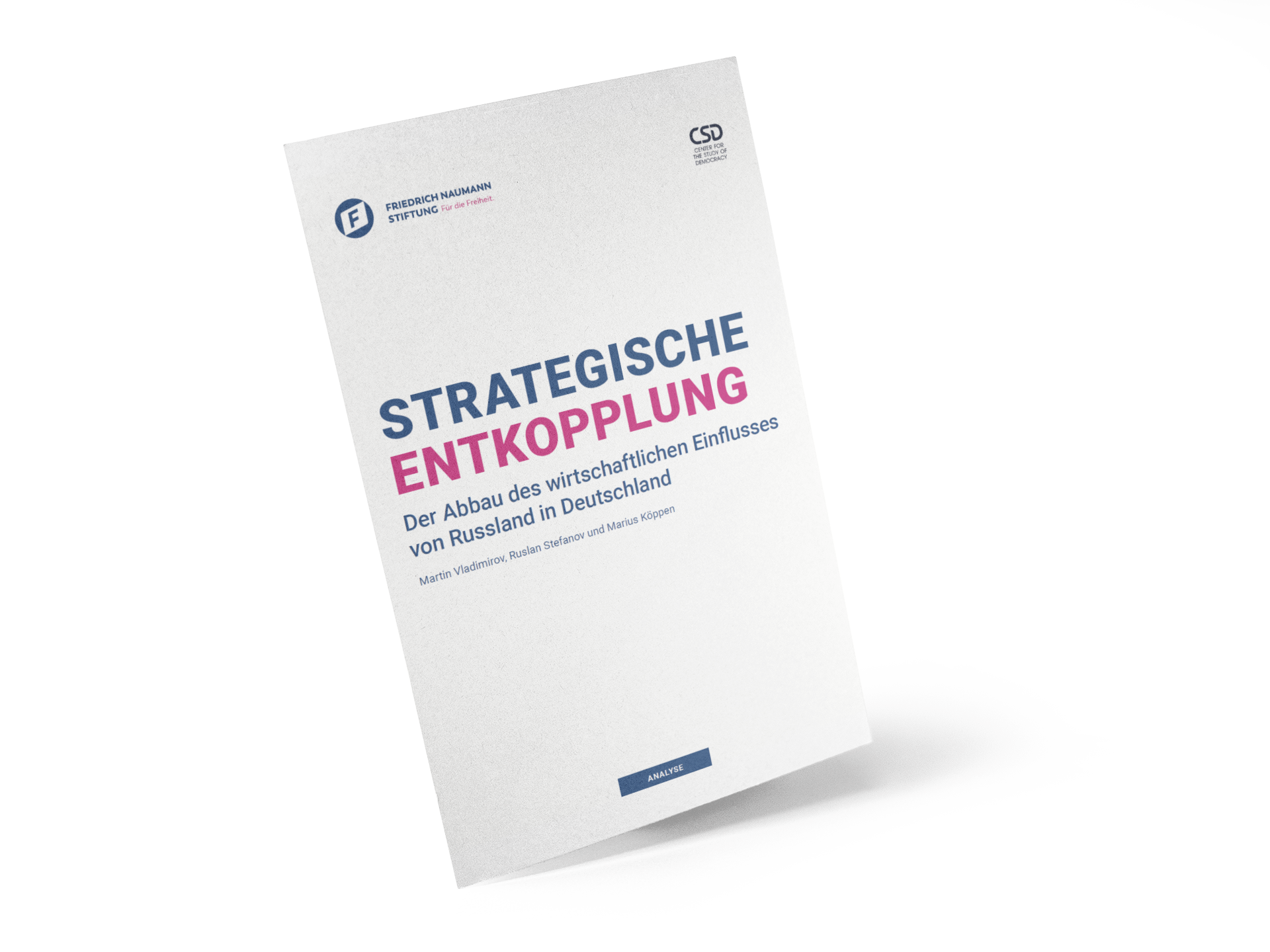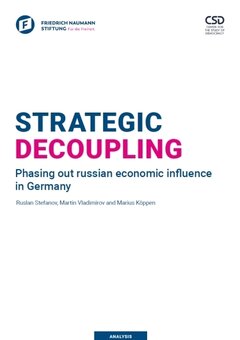Study
Strategic Decoupling: Phasing out russian economic influence in Germany

The cornerstone of the Russian-German economic ties has been the import of cheap Russian energy for powering German heavy manufacturing, which then exports back high added value products and sophisticated technology. While the bilateral trade turnover had been on the decline already before the Russian invasion of Ukraine, German companies had invested more than EUR 21 billion by the end of 2021, making the country the third biggest investor in Russia following Cyprus and the Netherlands. Although Russian Foreign Direct Investment (FDI) in Germany is comparatively miniscule, it has been concentrated in a few strategic economic sectors such as energy supply (mostly oil refining, natural gas transmission, storage and distribution).
Many German companies continue operating in Russia and there are still several thousand Russian firms active in different German markets. Given Russia’s proven track record in abusing corporate networks for foreign policy goals, including through deploying strategic corruption, these company networks pose economic and investment security risks. These risks are likely to increase as the Kremlin seeks to evade sanctions by further obfuscating final beneficial ownership of its companies.
There were 1713 companies with Russian ultimate beneficial ownership in Germany at the end of 2022. The Russian corporate presence in Germany is highly concentrated in around 40 larger firms, which specialize in oil refining, natural gas supply and distribution, metal and plastic products manufacturing, glass production, and transport. These firms employ thousands of personnel and possess strategic assets worth billions. EU sanctions have limited the capacity of these firms from gaining further strategic edge and from acquiring more assets in certain industries in Europe. Yet, their potential for malign influence through the abuse of their local corporate networks and/or covert operations remains high.
The geopolitical risks to the energy and climate security of Germany have markedly increased after Russia’s annexation of Crimea in 2014. The share of Russian gas increased to 49% of total German gas imports by 2019, compared to 34% in 2009. As a result of this short-sighted policy bet, at the time of Moscow’s invasion in Ukraine in February 2022, Germany was one of the most vulnerable EU countries in terms of security of supply and overall energy and climate security vis-à-vis Russia. In the first weeks of the invasion, German businesses were one of the most vocal prophets of an impending geoeconomic Armageddon for Europe, disorienting and delaying EU and Germany’s strategic policy response. The decade-long delay in responding to Russia’s aggressive authoritarianism led to a painful tradeoff for Germany.
According to CSD’s Energy and Climate Security Risk Index (ECSRI), the significant improvement of the security of German energy supply on the back of measures to almost completely phase out Russian oil, gas and coal imports came at an enormous costs in the form of higher energy poverty and diminished industrial competitiveness.
The Kremlin’s war in Ukraine has disenchanted decades of German foreign policy towards Russia. The scale and brutality of the Russian invasion have summoned a decisive response from the German society and the German government, following the initial shock. As a result, Germany has quickly inaugurated emergency economic security and decoupling polices in the energy sector, and has upheld unprecedented EU and G-7 sanctions and technology and goods control on Russia. Next, Germany needs to work on strengthening further its national and the European economic security institutions.
As a first line of defense, Germany needs to complete its decoupling from Russia to make sure Moscow would not be able to deploy any of its Kremlin Playbook instruments in the future. The German government needs to develop capacity to design and implement a well calibrated economic de-risking strategy, as a major dress-rehearsal for addressing China’s rising global assertiveness. Germany should spearhead and support EU efforts to design and kick start a common economic security strategy with its respective instruments on risk assessment, investment screening, customs and financial intelligence coordination, anti-money laundering, etc. Economic security needs to be counterbalanced with a comprehensive European nearshoring and investment strategy built around leadership in green and digital technologies.
The next steps of Germany’s decoupling and de-risking of its economic relationship with Russia should see the German businesses continuously and gradually phase out their ex-posure to the Russian market by closing their operations in Russia and by letting joint ventures and corporate partnerships with Russian companies expire. There is also an urgent need to continuously map the informal Russian economic and political networks active in Germany and dismantle their influence. Germany and the EU need to build up institutional defenses to fend off strategic corruption attempts and raids on Europe’s technological base.
Germany’s economic security strategy requires sophisticated mechanisms for screening and halting of overt and covert Russian strategic investments in Europe linked to state-owned companies and oligarchic networks close to the Kremlin. Such screening needs to be complemented by measures for ensuring intrа-EU corporate ownership transparency and the strengthening of the European anti-money laundering infrastructure and efforts on reducing the Kremlin’s hidden economic footprint in Europe. On the EU level, a common EU mechanism for sanctions enforcement is needed that prescribes specific requirements for national customs officials to investigate the ultimate beneficial ownership of the EU companies selling sanctioned and dual use goods and that of buyers in third countries.
This text is an excerpt from the publication. You can read and download the complete study here.

